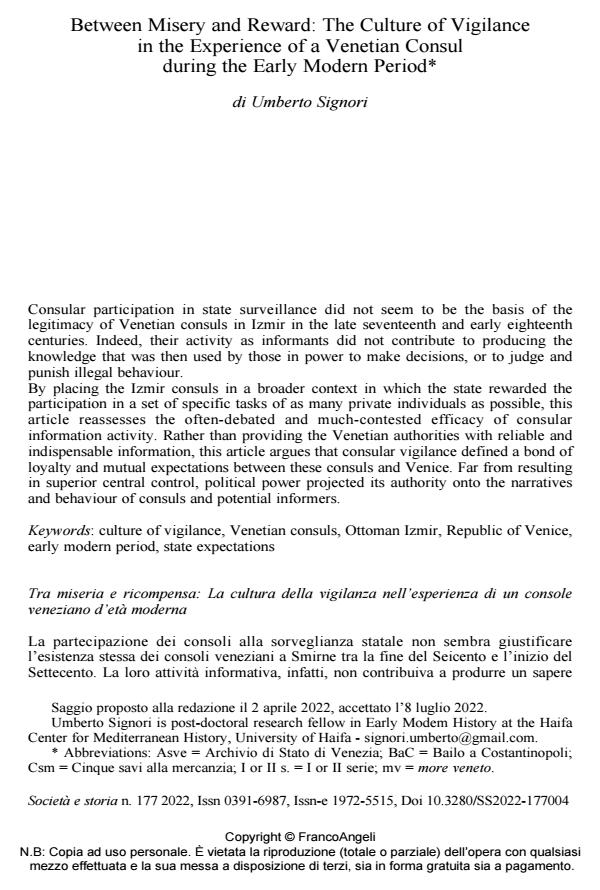Between Misery and Reward: The Culture of Vigilance in the Experience of a Venetian Consul during the Early Modern Period
Titolo Rivista SOCIETÀ E STORIA
Autori/Curatori Umberto Signori
Anno di pubblicazione 2022 Fascicolo 2022/177
Lingua Inglese Numero pagine 20 P. 526-545 Dimensione file 259 KB
DOI 10.3280/SS2022-177005
Il DOI è il codice a barre della proprietà intellettuale: per saperne di più
clicca qui
Qui sotto puoi vedere in anteprima la prima pagina di questo articolo.
Se questo articolo ti interessa, lo puoi acquistare (e scaricare in formato pdf) seguendo le facili indicazioni per acquistare il download credit. Acquista Download Credits per scaricare questo Articolo in formato PDF

FrancoAngeli è membro della Publishers International Linking Association, Inc (PILA), associazione indipendente e non profit per facilitare (attraverso i servizi tecnologici implementati da CrossRef.org) l’accesso degli studiosi ai contenuti digitali nelle pubblicazioni professionali e scientifiche.
Consular participation in state surveillance did not seem to be the basis of the legitimacy of Venetian consuls in Izmir in the late seventeenth and early eighteenth centuries. Indeed, their activity as informants did not contribute to producing the knowledge that was then used by those in power to make decisions, or to judge and punish illegal behaviour. By placing the Izmir consuls in a broader context in which the state rewarded the participation in a set of specific tasks of as many private individuals as possible, this article reassesses the oftendebated and much-contested efficacy of consular information activity. Rather than providing the Venetian authorities with reliable and indispensable information, this article argues that consular vigilance defined a bond of loyalty and mutual expectations between these consuls and Venice. Far from resulting in superior central control, political power projected its authority onto the narratives and behaviour of consuls and potential informers.
La partecipazione dei consoli alla sorveglianza statale non sembra giustificare l’esistenza stessa dei consoli veneziani a Smirne tra la fine del Seicento e l’inizio del Settecento. La loro attività informativa, infatti, non contribuiva a produrre un sapere usato poi dal potere politico per prendere decisioni, giudicare o punire i comportamenti illegali. Situando i consoli di Smirne in un contesto più ampio in cui lo Stato premiava la partecipazione a una serie di compiti specifici del maggior numero possibile di individui privati, l’articolo rivaluta l’efficacia, spesso discussa e molto contestata, dell’attività informativa consolare. Piuttosto che assicurare alle autorità veneziane informazioni affidabili e indispensabili, questo articolo sostiene che la vigilanza consolare definiva un legame di fedeltà e di aspettative reciproche tra questi consoli e Venezia. Lungi dal tradursi in un controllo centrale superiore, in tal modo il potere politico esercitava la sua autorità sulle narrazioni e sul comportamento dei consoli e dei potenziali informatori.
Parole chiave:cultura della vigilanza, consoli veneziani, Smirne ottomana, Repubblica di Venezia, età moderna, aspettative statali.
Umberto Signori, Between Misery and Reward: The Culture of Vigilance in the Experience of a Venetian Consul during the Early Modern Period in "SOCIETÀ E STORIA " 177/2022, pp 526-545, DOI: 10.3280/SS2022-177005